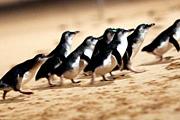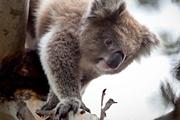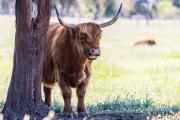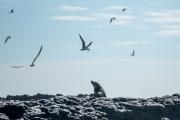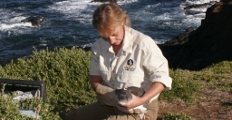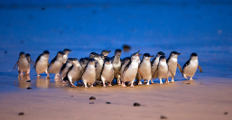Penguin sub-colony study reveals differences in their breeding and search for food
Penguin sub-colony study reveals differences in their breeding and search for food
A study into sub-colonies within Phillip Island’s 40,000 strong little penguin population has discovered differences in how they reproduce and find food.
Scientists from Phillip Island Nature Parks and Monash University wanted to understand differences within the colony on how the penguins forage and breed. They focus on two distinct subgroups, or sub-colonies, located about two kilometres apart.
Monash University honours student Jessica Pulvirenti led the research, explains:
"Our aim was to unravel the mysteries behind the penguins' foraging and reproductive success at sub-colony level,” she said. “Through our deliberate decision to study sub-colonies, we uncovered distinctions that can provide valuable insights for tailoring conservation efforts to meet the specific needs of each sub-colony”.
The team closely monitored the penguins using frequent nest checks and an automated penguin monitoring system, with penguins marked with electronic tags crossing the equivalent of a ‘penguin tollway’ on their way out of the ocean to their nests.
Nature Parks Penguin Scientist Associate Professor Andre Chiaradia said the team sought to determine if the penguins in each sub-colony exhibited varying levels of success in finding food and reproducing.
“This approach allowed us to gain invaluable insights into their life cycle at a more localised level," he said.
During the early breeding stages, one sub-colony faced more challenges finding food, while the other showed higher breeding and foraging success rates. This dynamic shifted as the breeding process progressed and chicks became more independent.
"Our research highlights the importance of considering sub-colony level differences in managing and conserving the mega colony of little penguins at Phillip Island by customising conservation initiatives that address the unique requirements of each sub-colony,” Associate Professor Chiaradia said.
“By understanding the varying responses of penguin sub-colonies to environmental conditions, we can develop more effective strategies to safeguard these remarkable species."
To evaluate the impact of ocean temperature on foraging, the researchers turned to satellite data.
"Our findings suggest a strong relationship between sea surface temperature and the penguins' foraging performance," said Professor Richard Reina from Monash University.
"Concerningly, we found that the breeding success of were negatively influenced by increasing sea surface temperatures."
These new findings pave the way for improved conservation plans that can protect not only little penguins but also other colonial seabirds facing similar challenges of rising ocean temperatures.
The study has been published in the Royal Society of London’s Open Science journal.





